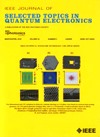Submission Deadline: February 1 (Tue), 2021
Hard Copy Publication: November/December, 2021
Call for Papers
The IEEE Journal of Selected Topics in Quantum Electronics (JSTQE) invites manuscript submissions in Nanobiophotonics. Nanobiophotonics is an advanced field of modern science and biomedical nanotechnology. It has been leading recently to the development of innovative nanotechnologies that provide noninvasive optical imaging, sensing, precise diagnostics and therapeutics at cellular, intracellular and molecular levels with an unprecedented ultrahigh resolution beyond the diffraction barrier in the sub-wavelength nanoscale range (below 100 nm). The IEEE Journal of Selected Topics in Quantum Electronics (JSTQE) invites manuscript submissions in the area of Nanobiophotonics. The purpose of this issue of JSTQE is to highlight the recent progress and trends in developing of leading-edge nanobiophotonics technologies. Areas of interest include (but not limited to):
Light Sciences and Technologies (Photonics) will play a relevant role in the envisioned Smart Factory of the fourth Industrial revolution (Industry 4.0). The IEEE Journal of Selected Topics in Quantum Electronics (JSTQE) invites manuscript submissions in Photonics for Industry 4.0 which concerns with the automatic collection of data from machines, processes, applications, and transforming that data into immediate insights. Design, simulation, fabrication equipment and processes, on-line failure detection, quality control, safety and security, and storage, among others, must be all integrated in a factory system. Smart factories must be driven by intelligence on demand.
The IEEE Journal of Selected Topics in Quantum Electronics (JSTQE) invites manuscript submissions in the area of Light Based Technologies for Industry 4.0. Areas of interest include (but are not limited to):
A) Light Based Advanced Communications for Industry 4.0: 1-Devices, Subsystems, Systems and Networks based on Optical technologies (for lowlatency and low-jitter local-area and wide-area networking; for accommodating large numbers of small end-users; architectures enabling autonomy and security in Industry 4.0 applications; highly reliable optical communication systems and networks for robust and safe manufacturing environments). 2-Microwave Photonics. 3-Reliable and High-Speed Optical Wireless technologies such as LiFi. 4-Hybrid-Technology Communication Systems and Networks (e.g. optical/wireless).
B) Light Based Sensing for Industry 4.0: 5-Non Image Based Sensors and Sensor Networks (using optical fiber and optical/optoelectronic integrated technologies; laser, spectroscopic, fluorescence/colorimetric, plasmonic and wireless light based sensors). 6-Image-Based Sensors (sensors that use images to detect and/or to measure measurands). 7-Smart Sensors (light based sensors supplying actuation signals in the electric domain). 8-Sensor Fusion (integration of multiple sensors to reduce the amount of uncertainty and improve the reliability of devices, systems or processes). 9-Other Photonic Based Sensors for Industry 4.0.
C) Light Based Advanced Manufacturing. Material welding and material treatments for Digital Laser Advanced Manufacturing: 10-Laser Additive and Subtractive advanced fabrication (3D two-photon polymerization, isomerization; multiphoton lithography, printing hybrid devices by laser, selective laser sintering, laser subtractive manufacturing, laser forward transfer). 11-Laser Materials Advanced Treatments (surface functionalization, refraction index custom functionalization on/in optical materials, materials welding, laser-based hybrid processing, modeling of laser-material processes for quantitative prediction of critical parameters). 12-Emerging Ultrafast Laser Technologies and Systems for advanced fabrication.
D) Transversal Topics for Photonics in Industry 4.0: 13- Hybrid Optical Technologies combining communications with metrology, sensing, or materials processing. 14- Automation and the Role of the Cloud in light-based technologies. 15-Artificial Intelligence, AI, for optical communications, sensors, sensor networks, and advanced manufacturing. 16-Augmented Reality, AR, for Industry 4.0.

